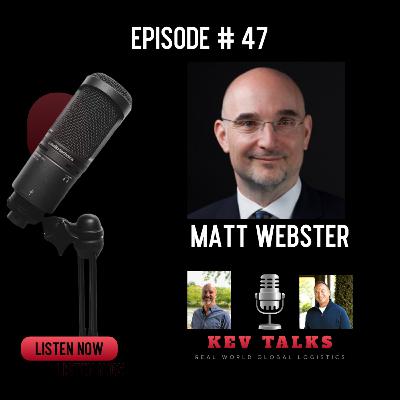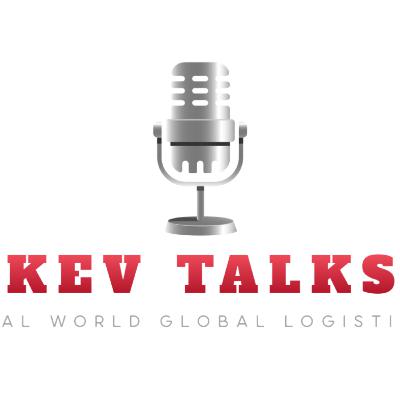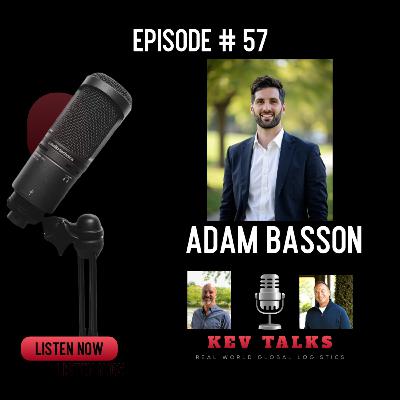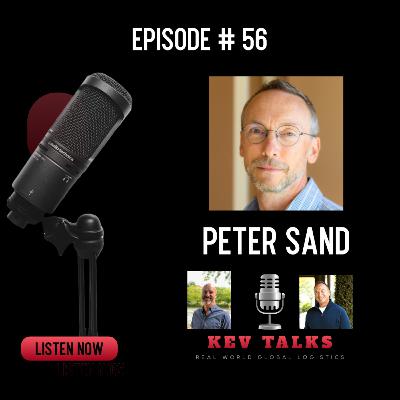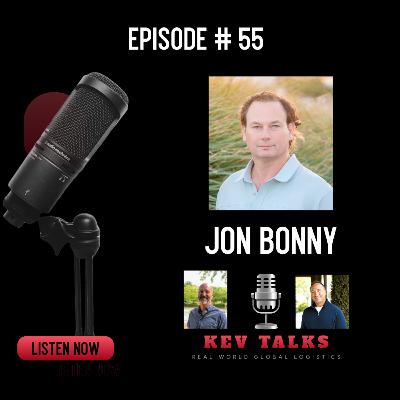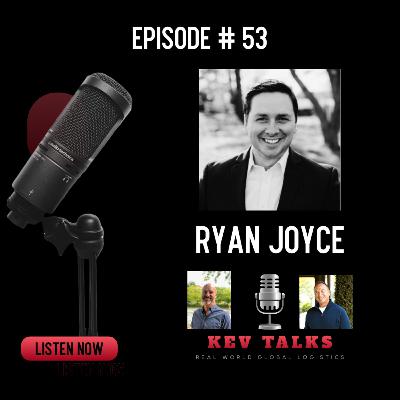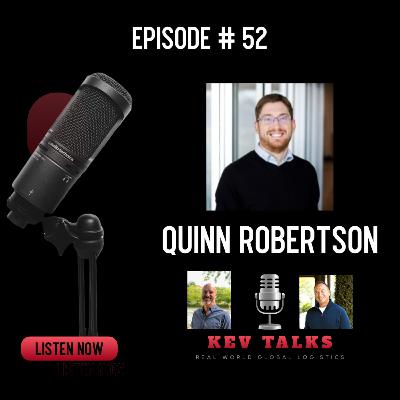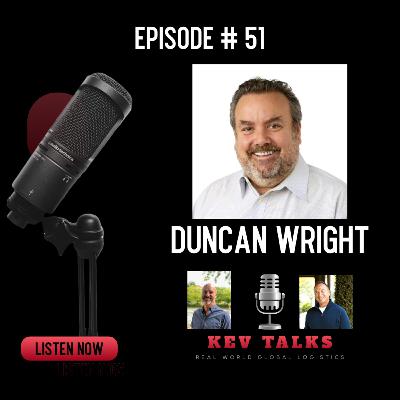Discover Kev Talks - REAL World Global Logistics
Kev Talks - REAL World Global Logistics

Kev Talks - REAL World Global Logistics
Author: Kevin Higgins and Kevin Parkerson
Subscribed: 4Played: 17Subscribe
Share
© Kevin Higgins and Kevin Parkerson
Description
Kev Talks- Real World Global Logistics is your premier source for expert insights and innovative strategies in global logistics and supply chain management. Hosted by two seasoned industry veterans, each with over 30 years of experience, our mission is to educate, inspire, and connect professionals across the logistics landscape. We delve into the latest trends, share actionable advice, and bring forward the voices of industry leaders to help our listeners navigate the complexities of the global supply chain with confidence and foresight."
75 Episodes
Reverse
n this episode, we dive into one of the most urgent but often overlooked risks in global logistics: cybersecurity. Matthew Webster, a cybersecurity expert and founder of Cyvergence, explains why cyber defense isn’t just an IT problem- it’s a governance issue that belongs in the boardroom.From port operators to ERP providers to Fortune 500 supply chains, every sector is a target. Matt breaks down how bias, blind spots, and “it won’t happen to us” thinking keep companies vulnerable. He highlights how legacy systems, weak patching practices, and lack of governance led to headline-making breaches like Maersk’s NotPetya attack and, more recently, disruptions at UNFI.Key insights from the conversation include:· Cybersecurity = Governance: Leadership bias and lack of oversight are as dangerous as technical flaws.· Real Supply Chain Risks: Ports, IoT/SCADA systems, and ERPs are prime targets — and a breach here stops freight, not just networks.· AI & Deepfakes: Attackers now use AI to create convincing phishing schemes and social engineering tactics that even experienced teams can fall for.· Red Flags: Poor patching discipline, unsecured IoT devices, and weak identity controls remain common failure points.· Bright Spots: The cybersecurity industry is innovating rapidly, with thousands of new tools and AI-driven detection systems. Many breaches can be prevented with simple governance processes, user training, and practical validation steps.Matt leaves listeners with both a warning and a call to action: stop treating cyber as someone else’s problem. If you’re a logistics manager, supply chain VP, or board member, cybersecurity needs to be part of your strategy. Resilient supply chains aren’t just faster and smarter, they’re safer, too.https://www.cyvergence.biz/
In this episode of Kev Talks: Real World Global Logistics, hosts Kevin Parkerson and Kevin Higgins sit down with Ken Uriu, SVP of Business Development for the Pacific Region at IMC Logistics, to unpack the real-world friction points shaping export logistics, port operations, and drayage strategy in 2025.With a career spanning NYK Line, the Port of Long Beach, and now IMC, Ken offers a rare 360-degree view of the global supply chain—from rural Idaho accounts to macro-level policy decisions.🔍 Key Topics:Export Friction, Explained:Why U.S. exporters struggle with equipment shortages, early return date (ERD) shifts, and a lack of contingency planning.Street Turns – Theory vs. Reality:The promise of container reuse sounds simple—but terminal tech, chassis fragmentation, and monetized platforms make it maddeningly complex.Chassis Control = Service Control:Ken outlines the case for private chassis use, especially for specialized moves (like reefers), and calls for less ocean carrier interference.Rates vs. Reality:The team discusses how outdated pricing structures are crushing drayage providers operating under today’s regulatory and cost pressures.Port Politics & Public Engagement:Ports are public agencies. Ken explains why logistics professionals need to build relationships with port authorities—before the next disruption hits.Tech Isn’t a Silver Bullet:Point solutions and walled-off platforms won’t solve systemic issues. Ken calls for collaboration and interoperability, not just more apps.🧠 Leadership Insights:“No job is too small” – why young professionals should get their hands dirty and take regional roles, even in unlikely places.“You either win or learn” – the mindset shift required to thrive in an unpredictable industry.🚛 Competitive Edge:Ken also shares how IMC Logistics uses its import scale and private chassis control to deliver agile, scalable export solutions, especially in challenged inland markets like California’s Central Valley.🔥 Final Takeaway:Export logistics success hinges on flexibility, relationships, and local knowledge. Whether it's a misaligned terminal appointment or a stalled chassis swap, the details matter—and fixing them is what separates vendors from true partners.🎧 Listen to Episode 40 of Kev Talks: Real World Global Logistics—available now on Apple Podcasts, Spotify, YouTube, and wherever you get your logistics fix.
Featuring Tracy Black, Matt Waller, and Steve MooreIn this live episode of Kev Talks: Real World Global Logistics, we unpack how Northwest Arkansas grew into one of the most influential supply chain ecosystems in the country.The foundation starts with Walmart and the ripple effect of its supplier, carrier, and talent networks. Add in deregulation, the rise of companies like J.B. Hunt, the global food supply chain presence of Tyson Foods, and the technology-driven brokerage model of Uber Freight, along with deep industry integration at the University of Arkansas, and you get a region with unmatched supply chain knowledge density.The panel discusses:Why NWA’s ecosystem rivals major logistics hubsHow technology shifted the model from asset-heavy to cloud and AI-drivenThe leadership and communication skills the next generation must buildThe risks of complacency in a fast-moving, tech-powered industryThe takeaway is simple. Northwest Arkansas is not just a retail town. It is a people-led, tech-powered supply chain engine that continues to compound its advantage.If you want to understand how a heartland region became a global logistics force, this episode delivers.This episode is sponsored by Ozark CSCMP.
In this special LEGENDS Series episode of Kev Talks: Real World Global Logistics, we sit down with industry veteran Tim Yatsko for a candid conversation about leadership, longevity, and what it really takes to build a lasting career in supply chain.Tim shares hard-earned lessons from decades in the logistics world. This isn’t theory. It’s experience shaped by market cycles, disruption, transformation, and the constant pressure to deliver. He reflects on the evolution of global logistics, the decisions that matter most, and the leadership principles that stand the test of time.The discussion goes beyond freight and operations. Tim talks about resilience, building strong teams, navigating uncertainty, and why reputation and relationships still matter more than ever. There’s insight for seasoned executives, emerging leaders, and anyone trying to build something meaningful in this industry.The LEGENDS Series is about honoring leaders who helped shape the profession. This episode delivers exactly that. Practical wisdom. Straight talk. And a reminder that while technology and markets change, strong leadership never goes out of style.
In this episode of Kev Talks, Vincent Iacopella, Chief Strategy Officer at Alba Wheels Up International, shares his extensive experience in global logistics and trade compliance. He discusses the evolution of technology in the logistics sector, emphasizing the importance of visibility and compliance in supply chains. Vincent highlights the intersection of government regulations and commercial interests, advocating for proactive compliance and transparency as competitive advantages. He also reflects on his career journey, offering insights into the challenges and opportunities within the industry, and provides valuable advice for executives navigating global trade today.
In this episode of Kev Talks: Real World Global Logistics, we sit down with Maurizio Scrofani for a thoughtful, no-nonsense conversation about what it really takes to run, fix, and future-proof supply chains in the real world.Maurizio brings more than three decades of experience across retail, wholesale, logistics, and manufacturing, and it shows. He doesn’t talk in buzzwords. He talks about the work. The hard part of the job that lives between fixing what’s broken and building what comes next.We dig into why so many supply chain transformations stall out. Not because of lack of technology, but because organizations move too fast, skip the fundamentals, and throw money at tools before they truly understand their problems. Visibility, accountability, and clean data come up again and again, not as nice-to-haves, but as non-negotiables.Maurizio also challenges a common myth in innovation. Startups, and even large enterprises trying to act like them, can’t optimize for speed, cost, and service all at once. You have to choose. Focus creates clarity, and clarity drives execution.The conversation goes beyond systems and into leadership. We talk about why supply chain is inseparable from brand reputation, why emotional intelligence is becoming a core leadership skill, and how entrepreneurial thinking can and should exist inside established companies.Looking ahead, Maurizio shares a grounded view on AI. Powerful, yes. Transformative, absolutely. But not a decision-maker. He makes a compelling case for using AI as a research and enablement tool, while keeping accountability firmly in human hands.This episode is equal parts practical, strategic, and human. If you’re responsible for a supply chain, building a company, or leading people through constant change, there’s something here for you.Key takeaways include:• Why fixing broken systems and building new ones must happen in parallel• The real reasons visibility and accountability break down• Why clean data is the foundation for scale and growth• How simpler KPIs drive better ownership and execution• Why supply chain leadership now requires emotional intelligence• How to think about AI without giving away decision authorityMaurizio Scrofani is a globally respected supply chain executive, startup advisor, and transformation leader. A proud Italian immigrant based in the New York City area, he brings a people-first approach to operational excellence and a deep belief that supply chains are not just a cost center, but a competitive advantage.This is a conversation about doing the work the right way — and doing it with purpose.
Kevin Parkerson and Kevin Higgins sit down with longtime industry innovator Mike Simon for a wide-ranging, real-world conversation about how technology, leadership, and listening shape the future of global logistics. From the early days of containerization and Walmart’s groundbreaking transportation systems to today’s conversations around AI, low-code platforms, and ecosystem visibility, this episode connects past lessons to where supply chain leadership is headed next. It’s a practical, thoughtful look at how logistics innovation actually happens when vision meets execution.
In this episode of Kev Talks: Real World Global Logistics, hosts Kevin Parkerson and Kevin Higgins explore the evolving landscape of warehouse operations, labor management, and AI-driven logistics. Their guest, Lee Rector, draws on decades of experience to provide actionable insights on how businesses can optimize workforce productivity, reduce labor costs, and prepare for the labor challenges of the future. From small wins in mid-sized warehouses to large-scale global implementations, the discussion highlights how data, technology, and strategic planning can drive measurable ROI without massive capital investment.Lee Rector is a veteran supply chain expert and founder of Labor AI, a prescriptive analytics solution designed to right-size warehouse staffing. With experience in over 40 countries and more than a thousand customers, Rector specializes in helping companies integrate labor planning with warehouse automation. He is also the author of Warehouse 101 and a recognized thought leader in supply chain efficiency, workforce optimization, and AI-driven operations.Key Takeaways· Labor AI helps companies use real-time and historical data to optimize workforce allocation and make informed operational decisions.· Proper technology adoption requires engaging frontline teams early and addressing “what’s in it for me” to ensure buy-in and success.· Many automation projects fail due to poor integration with existing WMS systems; aligning labor and automation is critical.· Operational insights from data can improve efficiency across multiple sites, yielding 5–20% savings without new capital investment.· Urban sprawl, labor shortages, and demographic shifts will increasingly challenge warehouse staffing, making strategic planning essential.· Small and medium-sized businesses can achieve rapid ROI using AI-driven tools to analyze productivity, right-size labor, and reduce errors.Future OutlookLee predicts that traditional WMS platforms will evolve or be replaced by systems integrating labor and automation simultaneously, providing more accurate real-time insights. He also highlights the increasing importance of workforce location, commuting patterns, and labor availability in site planning.How to ConnectLearn more about Labor AI at https://getlaborai.com/, explore Rector’s book on Amazon, or connect directly with him via LinkedIn.
In this episode of Kev Talks: Real World Global Logistics, Kevin Higgins and Kevin Parkerson reflect on the close of 2025 and the fast arrival of 2026. They discuss why intentions often matter more than traditional New Year resolutions, especially in an industry shaped by constant change.The conversation looks back at 2025 as a relatively calm year in logistics and turns forward to what’s ahead, including new podcast series, deeper discussions on technology and AI, live events, and continued focus on community, industry legends, and Northwest Arkansas as a growing logistics hub.This episode sets an intentional, optimistic tone for the year ahead and reinforces the podcast’s commitment to real-world insights, connection, and supporting the next generation of supply chain leaders.
In this episode of Kev Talks: Real World Global Logistics, hosts Kevin Parkerson and Kevin Higgins explore the realities of career transitions, job searching, and talent acquisition within the logistics and supply chain industry. Amid widespread layoffs in trucking, manufacturing, and many other industries, the discussion centers on actionable strategies for both job seekers and hiring managers to navigate today’s competitive market.Guest Introduction:Becky from PTI Learning and Performance and Lisa from Moxie Consulting bring expertise in HR, career coaching, and workforce strategy. They share practical insights into resume optimization, networking, and staying motivated during challenging job searches.Key Takeaways:For Job Seekers:· Highlight achievements rather than tasks on resumes, using quantitative metrics when possible.· Optimize LinkedIn profiles with professional photos, clear headlines, and active engagement.· Leverage both strong and weak connections for networking; referrals elevate applications.· Use tools like Job Scan, Indeed, Glassdoor, and alumni networks to improve visibility.· Practice “realistic optimism”: combine perseverance, organization, and follow-up with proactive networking.· Quick, actionable steps: conduct self-assessments, create pros and cons lists, or reach out to a trusted colleague for advice—all possible in 15 minutes.· Manage the emotional toll: take breaks, explore hobbies, engage in learning, or work with a career coach or counselor.· Inspirational mindset: “Just keep swimming” (Finding Nemo) and maintain a “goldfish memory” (Ted Lasso) to handle rejections without dwelling on them.For Hiring Managers:· Promote a positive company culture and highlight why it’s a great place to work beyond compensation.· Be prepared for interviews and treat candidates respectfully—being unprepared sends the wrong message.· Be open-minded: consider candidates at different career stages or who may want to pivot to roles below their previous level.· Remember: technical skills can be taught, but personality, drive, and ambition cannot.The episode concludes with a lighthearted discussion on motivational “job search playlists,” featuring classics like Don’t Stop Believing, I Will Survive, Shake It Off, and It’s Raining Men (yes!), reminding listeners to keep energy and morale high during their career journeys.Becky and Lisa emphasize confidence, perseverance, and realistic optimism in finding a role that fits—not just a job, but a career that brings satisfaction and purpose.Connect with Guests:· Lisa (Moxie Consulting): getmoremoxie.com | LinkedIn· Becky (PTI Learning and Performance): LinkedIn
Guests: Jim Gillis (IMC Logistics) & Eric Sauer (California Trucking Association)In this episode, we dive into the challenges and opportunities for trucking in California. From ZEV fleet mandates and rising operational costs to driver retention, parking, and cargo theft, Jim and Eric share insights on how carriers, shippers, and importers can navigate the complex regulatory and economic landscape. They also highlight the growing diversity in the driver workforce and why staying engaged with industry associations is crucial for success.Key Takeaways:California trucking faces high costs, strict regulations, and parking shortages.Driver workforce trends are shifting younger with more women entering the industry.Associations like CTA play a key role in advocacy and policy.Cargo theft remains a critical issue—collaboration is essential.Resources:IMC Logistics: www.imcc.comCalifornia Trucking Association: www.caltrux.orgThis episode is sponsored by IMC Logistics
In this episode of Kev Talks: Real World Global Logistics, Kevin Parkerson and Kevin Higgins sit down with Milind Balaji, an experienced supply chain leader, to discuss the human, technological, and strategic elements shaping modern supply chains. Milind shares candid insights from his decades of experience, offering advice for current and aspiring supply chain professionals, while reflecting on the personal and professional lessons that have guided his career.Key Themes & Takeaways1. People and Team DynamicsEffective supply chain teams are built on trust, shared values, and strong communication.Teams must be agile, able to pivot quickly, and responsive to changing priorities.Listening to all levels of the organization—especially frontline employees—can uncover innovative ideas and solutions.2. Mentorship and Professional GrowthEarly mentorship is critical to navigating complex organizations and accelerating career growth.Being both a mentee and a mentor strengthens professional networks and creates lasting impact.Continuous learning and exposure to different facets of the supply chain—ports, carriers, factories—enhances understanding and expertise.3. Modern Supply Chain ChallengesTraditional supply chains were built for predictable demand patterns. Recent disruptions, including COVID-19, global trade shifts, and rising customer expectations for speed and visibility, require more adaptive approaches.Resilience is built by people and leaders, not just dashboards or systems.4. The Role of TechnologyAI, automation, and predictive analytics are transforming supply chains, moving professionals away from transactional tasks toward higher-value strategic decision-making.Generative AI today and agentic AI in the near future promise to improve workflow efficiency, enhance forecasting, and allow leaders to focus on proactive rather than reactive problem-solving.5. Future Supply Chain TrendsSupply chains will become more integrated, agile, and resilient, with silos between planning, operations, execution, and sales breaking down.Strategic decision-making, networked relationships, and technology adoption will define the supply chain of the future.6. Advice for Emerging LeadersStay curious and comfortable with uncertainty; challenges are daily.Build deep expertise in specific areas while maintaining a broad understanding of end-to-end operations.Cultivate relationships—they are critical capital for problem-solving and career growth.7. Personal Insights and ReflectionsCareer satisfaction comes from embracing new challenges, adopting emerging tools, and lifelong learning.Outside of work, family, hobbies like baking, and engagement with the industry in creative ways keep him grounded.Favorite maritime movie: Captain Phillips for its attention to detail and authenticity.Early career anecdotes, like overindulging in MREs, highlight personal growth and learning through experience.Episode TakeawayResilient and successful supply chains are built by people who are curious, adaptable, and committed to relationships. Technology and AI will reshape workflows, but leadership, mentorship, and human connection remain at the heart of supply chain excellence. This episode is sponsored by The Port of New Orleans. For more information, visit www.portnola.com
In this special Thanksgiving edition of Kev Talks: Real World Global Logistics, co-hosts Kevin Parkerson and Kevin Higgins take a moment to pause, reflect, and look back on some of the most memorable conversations from across 57 episodes and more than 44 hours of real-world supply chain storytelling. Instead of releasing a new episode during the Black Friday rush, they highlight the logistics leaders, innovators, and everyday problem solvers who have shaped the show and inspired global logistics professionals around the world.This episode isn’t about picking favorites, it’s about gratitude. Throughout the conversation, Kevin and Kevin revisit standout moments that stayed with them, from leadership lessons and import/export challenges to the surprising, funny, and insightful stories that define the global logistics community. They also share listener milestones, behind-the-scenes memories, and a few episodes that new listeners should check out first (including the infamous “Kevapalooza”).The discussion brings together the best of what the podcast stands for, authentic conversations, practical wisdom, and a genuine appreciation for the people who move the world’s freight, shape supply chain strategy, and drive innovation in logistics technology.Key TakeawaysA look back at 57 episodes covering supply chain leadership, freight strategy, and real-world shipping trends.Why every guest brings a lesson worth revisiting and why none can be labeled a “favorite.”Listener milestones and behind-the-scenes reflections on building a global logistics podcast.Why gratitude and reflection matter in a high-pressure industry like global logistics.A reminder to explore past episodes, including the popular “Kevapalooza.”🎧 Tune in now to hear real-world stories, lessons, and leadership insights from the front lines of global logistics.
In this episode, Kevin Parkerson and Kevin Higgins sit down with Adam Basson, founder of Flexchain, to explore actionable insights in logistics technology, supply chain strategy, and career advice for the next generation of supply chain professionals. Adam shares his perspective on prescriptive analytics, nearshoring trends, the balance between lean and resilient operations, and his approach to networking and professional growth.Key Takeaways:1. Actionable Analytics:o Adam emphasizes the importance of prescriptive analytics—dashboards should not just provide data but highlight actionable insights that can directly improve operational decisions.o Example: Zone skipping can optimize shipping costs and inform long-term warehouse network planning.2. Nearshoring Reality vs. Hype:o Nearshoring is a long-term trend driven by labor, energy, and geopolitical factors.o Adam notes that industries vary in readiness for relocation; some may remain in China, others shift to Mexico, South America, or closer regions depending on production needs and regulations.o Local supply chains can allow businesses to stay lean while being more resilient due to shorter lead times and better inventory control.3. Target Business Focus:o Flexchain primarily serves mid-market companies ($20M–$700M) that lack dedicated logistics teams or national carrier contracts but need operational advantage from data-driven insights.4. Networking and Professional Development:o Adam restarted the CSCMP South Florida roundtable to foster a local professional ecosystem in a rapidly growing metro area.o Networking should be intentional, curiosity-driven, and relationship-focused rather than purely transactional.5. Future of Supply Chain:o AI and automation adoption will accelerate, helping companies modernize legacy systems and improve omni-channel fulfillment.o Nearshoring trends will continue in high-regulation industries like defense, healthcare, and semiconductors. Mexico and other nearby countries will see growth in medium-skill manufacturing.6. Advice for Young Professionals:o Understand the “why” behind supply chain decisions.o Develop skills in business fundamentals, data analytics, and enterprise systems.o Learn systematic problem-solving approaches such as Six Sigma, Lean, and integrated business planning.7. Work-Life Inspiration:o Adam balances technical work with business strategy, travel, and hobbies (like salsa dancing) to stay creative and energized.o Taking breaks and stepping away from challenges often leads to better solutions.8. Fun & Personal:o Favorite travel meal: Carne en su jugo in Guadalajara, Mexico—a flavorful beef stew with broth and tortillas.o Adam has traveled to over 20 countries and continues to explore new cultures for inspiration.Connect with Adam Basson / Flexchain:· LinkedIn: Adam Basson· Email: adam@flexchain.holdings
In this episode, Kevin and Kevin sit down with Peter Sand, Chief Analyst at Xeneta, to talk about where global ocean shipping stands today and what importers and logistics teams should prepare for as 2026 approaches. After several years of volatility driven by COVID-era surges, trade tensions, shifting tariffs, capacity swings, and the ongoing Red Sea disruption, many shippers are tired and looking for some level of stability. Peter helps frame the realities on the ground as we move into the next contract cycle.The conversation covers how spot and long-term rates are trending into 2026, whether recent rate “stability” is something companies can actually plan around, and what indicators matter more than headline GDP figures. Peter also breaks down how sourcing strategies are evolving, including the rise of Southeast Asia exports and the growing idea of “US plus one” to complement traditional China plus one approaches. He explains how importers can use capacity data, service reliability performance, and new vessel order books to understand which carriers may be under pressure and where negotiation leverage really exists.One clear takeaway: even in uncertain markets, shippers have options. Peter encourages importers to treat 2026 as a chance to rethink relationships, create more competitive request for quotes, and come better prepared with real data rather than reacting mid-negotiation. For mid-market importers especially, he recommends testing new partners, gathering more intelligence before bidding, and focusing on being a valued customer of choice over chasing pennies at the finish line.For more about the 2026 Ocean Outlook, click on the following link: https://www.xeneta.com/outlook/2026-ocean-freight-outlookThis episode is presented by Xeneta
In this episode of Kev Talks: Real World Global Logistics, Kevin Parkerson and Kevin Higgins sit down with Jon Bonny, Business Development at O’Neill Logistics, for an honest look at what’s happening inside the four walls of today’s warehouses — and where the industry is headed next.Jon shares how warehouse automation, robotics, and AI are transforming operations, workforce training, and performance metrics. He explains why the next phase of U.S. reshoring may begin with higher-value products like furniture and footwear, and how logistics professionals can prepare for that shift.The conversation also digs into what brands should look for in a 3PL partner — from trust and KPIs to total supply-chain cost visibility — plus how to build long-term partnerships that go beyond “price per pick.”Of course, it wouldn’t be Kev Talks without a few surprises. Jon opens up about his lifelong love of cars, his unlikely passion for croquet, and why mountain biking helps him clear his head after a long week in logistics.Key TakeawaysWhy warehouse automation and AI are reshaping labor planning and operationsHow to evaluate 3PL partnerships based on trust and performance, not just costThe real factors driving U.S. manufacturing’s comebackWhy the best tech still depends on skilled people behind itA fun side of Jon Bonny: from croquet tournaments to dream cars
This Halloween, we’re entering the only haunted house where the ghosts are misclassified shipments, phantom paperwork, and HTS codes that lurk after midnight. Kevin Parkerson haunts the show as the Ghost of a Supply Chain Manager, clipboard in hand, while Kevin Higgins concocts chaos as the Mad Scientist of Logistics.Joining them is Heather Rush of Harry F. Long Customs Brokers, ready to share tales from the Customs Crypt. From the Room of Lost Paperwork to tricks vs. treats in trade compliance, Heather dishes out real customs horror stories that could spook even the most seasoned importers, along with sweet tips to keep your shipments out of the crypt.Expect:· 👻 Phantom audits and compliance ghosts that haunt importers· 🍬 Treats like checklists, ACE portal tips, and classification cheat sheets· 💀 Horror stories about haunted dolls, vampire garlic, and zombie mannequins at customs· ⚡ Myth-busting fun: “HTS codes aren’t vampire-proof!”Whether you’re a logistics pro, importer, or just love a good spooky story, Episode #54 will teach you how to exorcise compliance demons and survive the haunted supply chain.
In this episode of Kev Talks: Real World Global Logistics, Kevin Parkerson and Kevin Higgins sit down with Ryan Joyce, founder of GenLogs, to explore how real-time data is reshaping trucking, asset tracking, and supply chain visibility.Ryan shares the journey from his time in U.S. intelligence to building a platform that tracks trucks, containers, and chassis across the U.S., offering unparalleled insight for freight brokers, shippers, and ports. We dive into:· How GenLogs provides real-time visibility of assets on the road and at ports· Network optimization and finding backhaul opportunities to save millions· The role of AI in making logistics smarter and more precise· Early adoption wins and how major players are leveraging GenLogs data· Leadership lessons from high-stakes environments applied to logisticsWhether you’re a shipper, carrier, or logistics professional, Ryan’s story highlights how data-driven insight can turn the “black hole” of domestic trucking into a clear, actionable picture.Connect with Ryan Joyce and GenLogs: genlogs.ioEpisode Sponsored by baysys.io
In this episode of Kev Talks: Real World Global Logistics, co-hosts Kevin Parkerson and Kevin Higgins sit down with Quinn Robertson, Director of 412 Angels, to explore how angel investing and startup innovation are reshaping Northwest Arkansas. From connecting early-stage founders with investors to building a regional hub for supply chain technology, Quinn shares how his work helps transform big ideas into thriving businesses—and why it matters for the broader logistics and supply chain ecosystem.Quinn Robertson leads 412 Angels, an investor network focused on funding and mentoring early-stage technology companies across Northwest Arkansas and the surrounding region. With a background in finance, startups, and venture development, Quinn plays a key role in connecting founders and investors to accelerate innovation in sectors like supply chain technology, retail tech, and logistics innovation. His work bridges the gap between capital and creativity, fostering a community where startups and investors grow together.Key Takeaways:How 412 Angels supports early-stage founders and builds investor networks across Northwest Arkansas and Tulsa.Why supply chain and retail tech startups are thriving in the region’s entrepreneurial ecosystem.Real-world advice for new investors and founders, starting with the principle of “give first.”How collaboration and community can fuel sustainable growth in logistics and beyond.Lessons from Quinn’s own journey into venture capital and what it takes to spot promising innovation early.Thanks to Pedal Park NWA for sponsoring this NWA Series episode. Visit pedalparknwa.com A special thank you to Jen Higgins from Anyway Socks for her support of domestic violence organizations. Get your socks at Dillards or at Anywaysocks.com
In this episode of Kev Talks: Real World Global Logistics, we welcome Duncan Wright, President of UWL, to dive deep into the realities and future of global logistics. Duncan’s career spans decades and continents, with leadership roles at Sealand, Horizon Lines, Top Ocean, and DeWell before taking the helm at UWL. Along the way, he’s built a reputation for blending operational expertise with forward-looking strategy.Duncan reflects on his early days at Sealand and how those experiences still shape the way he leads teams and navigates uncertainty today. He unpacks why he believes strong partnerships, not transactional deals, are the backbone of resilient supply chains. The conversation also turns to technology, where Duncan offers a sharp take on the role of AI, digitization, and what innovation truly matters versus what’s just noise.Most importantly, Duncan outlines his three rules for the next-generation supply chain playbook:Protect critical thinking in an increasingly automated world.Embrace flexibility as a competitive advantage.Stop planning for contingencies, build a structure that can execute them seamlessly.Whether you’re a shipper, a service provider, or simply trying to keep pace with today’s volatile logistics environment, Duncan’s insights are equal parts practical and visionary. This episode delivers an unfiltered look at where the industry has been, where it’s going, and what it takes to lead in a world where supply chains are more connected—and more vulnerable—than ever.


